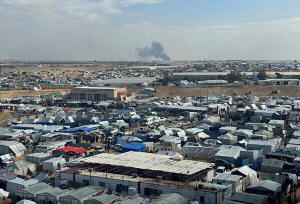World Court ruling looms for Israel as troops battle in Khan Younis
 Send a link to a friend
Send a link to a friend
 [January 26, 2024]
By Stephanie van den Berg, Bassam Masoud and Nidal al-Mughrabi [January 26, 2024]
By Stephanie van den Berg, Bassam Masoud and Nidal al-Mughrabi
THE HAGUE/GAZA (Reuters) -U.N. judges in The Hague will rule on Friday
whether to order Israel to suspend its military campaign in Gaza while
they hear a genocide case, as Israeli forces battled on to seize the
main southern city Khan Younis and trapped Gazans tried to flee.
The Israeli military said on Friday it was engaged in "intensive battles
in the heart of Khan Younis", with forces striking dozens of Hamas
fighters and infrastructure from the air and ground.
Residents said gunbattles raged overnight, with Israeli forces blowing
up buildings and houses in the western part of the city in what has
become one of its biggest offensives so far, waged among hundreds of
thousands of displaced civilians.
Gaza officials said the death toll from the campaign, now in its fourth
month, has risen to 26,083, with 183 killed in the past 24 hours and
many more feared trapped under flattened buildings.
The war, launched after Hamas fighters killed 1,200 people and captured
more than 240 hostages on Oct 7, has displaced most of the enclave's 2.3
million people, some multiple times.
The judges of the International Court of Justice (ICJ), also called the
World Court, are due to rule on Friday on South Africa's request for an
emergency order to Israel to cease fire while it hears a case accusing
Israel of state-led genocide.

Israel has called South Africa's allegations false and "grossly
distorted", and said it makes the utmost efforts to avoid civilian
casualties. It expressed confidence that the court would "throw out
these spurious and specious charges".
Hamas said it would abide by any ICJ ceasefire order if Israel
reciprocates.
The court will issue its ruling at 1 p.m. (1200 GMT) on the request for
an emergency ceasefire order. The judges will not yet rule on the merits
of the genocide allegations, which could take years. The ICJ's rulings
are final and without appeal, but it has no way of enforcing them.
"It is vital to highlight the plight of the innocent in Palestine and to
also alert the international community to the great harm that is being
done to the people of Palestine," South Africa's Foreign Minister Naledi
Pandor said.
HUGE ASSAULT
The huge assault this week on the city of Khan Younis is one of the
biggest yet, waged on territory sheltering hundreds of thousands of
thousands of displaced civilians who fled earlier battles elsewhere.
Israel said it had discovered some 200 tunnel shafts and destroyed more
than 130 militant infrastructure sites in its latest operations, as well
as killing "numerous militants".
Palestinians say Israel has blockaded hospitals making it impossible for
rescuers to reach the dead and wounded.
“We believe many victims are still under the rubble and on the roads,
the occupation prevents ambulance and civil emergency teams from
reaching them,” Gaza health ministry spokesman Ashraf Al-Qidra said.
Israel denies it has blockaded hospitals, but says military action near
them is necessary because Hamas fighters operate there, which the
militants and medical workers deny. The military said it was
coordinating with hospital staff to ensure they remain "operational and
accessible".
"The facts on the ground disprove the blatant misinformation that has
been disseminated over the last 72 hours falsely claiming that the
hospitals are under siege or attack," it said in a statement.

[to top of second column]
|

Smoke rises during an Israeli ground operation in Khan Younis, amid
the ongoing conflict between Israel and Hamas, as seen from a tent
camp sheltering displaced Palestinians in Rafah, in the southern
Gaza Strip, January 25, 2024. REUTERS/Bassam Masoud

GENOCIDE CONVENTION
The 1948 Genocide Convention, enacted in the wake of the mass murder
of Jews in the Nazi Holocaust, defines genocide as "acts committed
with intent to destroy, in whole or in part, a national, ethnical,
racial or religious group".
Israel describes the case as a distortion of actions it took to
defend itself after Hamas fighters stormed its territory and killed
its people. Its main ally Washington and other Western countries
call the case unfounded.
U.S. President Joe Biden, in a statement marking International
Holocaust Remembrance Day, denounced a surge in anti-semitism,
including "efforts to minimize the horrors that Hamas perpetrated on
October 7".
Palestinians said they hoped world powers had the courage to compel
Israel to stop the bombing if the ICJ orders a ceasefire.
"What happens if after the court Israel continued its massacres? The
world will appear like a joke,” said Tamer, 55, a businessman and
father of four now displaced in Rafah, the small city at Gaza's
southern edge where more than half the enclave's population is now
huddled, most in makeshift tents or public buildings.
“We are tired, our children are exhausted, they are deprived of
sleep and food," he said. "We are being starved and everyone awaits
his turn to die by Israeli bombs if this doesn’t end."
Palestinians who have dreamed of an independent state for
generations see the case as an historic moment of accountability.
"I feel that there is finally a movement, that the world is finally
taking action for the rights of the Palestinians and against
Israel's crime and also against the violation of international law,"
said Mo Kotesh, a third-generation Palestinian refugee preparing to
join a march to the courtroom in The Hague.

Thousands more Gazans have arrived in Rafah the past few days,
worsening the desperate hunt for food and a place to camp in the
rainy winter cold.
The Israeli military repeated orders on Friday for civilians to
evacuate swathes of southern and western Khan Younis and head to Al-Mawasi
further west. Residents say that has been impossible because roads
were blocked and under Israeli fire.
Aid agencies say thousands of Gazans now face starvation, especially
small children who are most vulnerable to malnutrition. Relentless
attacks against infrastructure and cold weather risked more civilian
casualties and making Gaza "completely uninhabitable", a U.N. agency
warned on Friday.
"Most have no warm clothes or blankets. Northern Gaza, where IDF
(Israel Defence Forces) bombardment continues, is barely accessible,
even to provide basic humanitarian aid," said Ajith Sunghay, head of
the U.N. Human Rights Office for the Occupied Palestinian Territory.
(Reporting by Nidal al-Mughrabi in Doha and Fadi Shana and Bassam
Masoud in Gaza, Stephanie van den Berg in The Hague; Additional
reporting by Henriette Chacar and Steven Scheer in Jerusalem,
Anthony Deutsch in Amsterdam, Nellie Peyton in Johannesburg; Writing
by Sharon SingletonEditing by Peter Graff)
[© 2024 Thomson Reuters. All rights reserved.]This material
may not be published, broadcast, rewritten or redistributed.
Thompson Reuters is solely responsible for this content. |